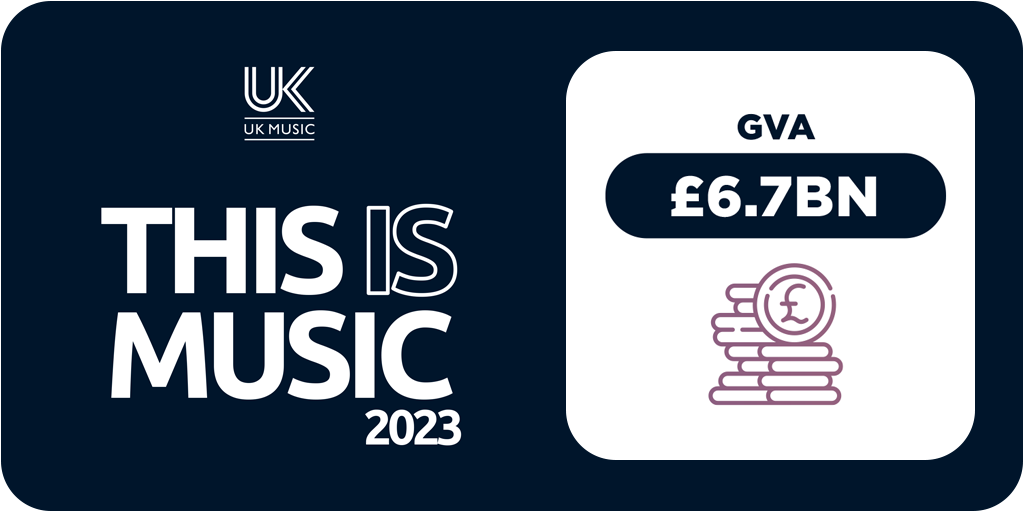This website uses cookies so that we can provide you with the best user experience possible. Cookie information is stored in your browser and performs functions such as recognising you when you return to our website and helping our team to understand which sections of the website you find most interesting and useful. For full details on the cookies used on our website, please visit our Cookies Policy page.
UK Music is the collective voice of the UK’s world-leading music industry. It represents all sectors of the industry, bringing them together to collaborate, campaign, and champion music. Since 2013, UK Music has produced the This is Music report, an annual report outlining the enormous economic contribution the UK music industry makes to the UK economy.
This is Music 2023, released in December last year, is the most significant report since its inception over a decade earlier. Reporting on 2022 figures, it details an economic snapshot of the UK music industry’s first year free from the restrictions of the COVID-19 epidemic. As Tom Kiehl, Interim Chief Executive of UK Music, states in his introduction:
“Whether it has been the growth of live music, the devastation of COVID-19, the challenges of Brexit or the opportunities of streaming, UK Music’s economic analysis work has over the years tracked huge changes in the sector, as well as the impact of dramatic and unforeseen events.
The 2023 report is no different. It tells the story of 2022, the year when the music industry recovers from the pandemic but where a number of challenges remain.”
Key headline statistics, compared with previous years’ reports paint a positive picture of the growth of UK Music:
UK music exports generated £4 billion in 2022, an increase of 37.5% compared with £2.5 billion in 20211
The industry employed 210,000 people, which is 0.6% of all jobs in the UK. You may consider this a small number of people, but it’s a significant amount compared with other industries. For example, it equates to as many people as the insurance, steel, and pharmaceutical industries combined2.
The most encouraging figure, though, is the Gross Value Added (GVA). This is how much value the music industry contributes to the UK economy. Compared with 2021, the UK Music industry grew by 67% from £4 billion in 2021 to £6.7 billion in 2022. When compared with a robust pre-COVID 2019 GVA of £5.8 billion, the UK music industry has risen, phoenix-like, by an impressive 15%1.
To cite the UK Music – Spring Budget 2024 Submission:
“Music is one of the UK’s most vibrant sectors: a national asset that generates billions of pounds for the economy, supports thousands of jobs across the country, and has a global cultural impact that underpins the UK’s status as a soft power superpower. It plays a fundamental role in the success of the UK’s world-leading creative industries, which feature as one of the Chancellor’s five priority growth sectors.”
We are almost halfway through 2024, and the UK music industry is vibrant and supporting thousands of jobs. It would not be disingenuous to say that the future is looking bright for the months and years ahead, although, as Tom Kiehl states, several challenges are remaining. This is Music 2023 celebrates success but also strikes a fair balance when recognising the ongoing challenges of Brexit, the cost of living, the malign, long-covid-like malingering of the pandemic, and the severe difficulties faced by music venues, independent festivals and recording studios.
UK Music rides the riff of the music industry in the UK, producing several essential industry reports throughout the year. Its most recent report is the APPG on Music Report on AI and Music 2024. It is an influential document calling for fresh legislation to support the UK music industry and fans by regulating artificial intelligence, which is fast becoming another challenging change.
All change, good or bad, is challenging, but if the figures are anything to go by, the UK music industry is riding a new wave of success with significant economic growth. With stalwart support, guidance and lobbying from UK Music to counter these challenges, they’ll help keep the music industry on a path toward growth.
Goldman Sachs predicts that by 2030 the global recorded music market will double in value, and the live sector will increase by a third2. With the UK Music Industry the second largest exporter of recorded music in the world, after the USA, there’s immense positivity arising from the ashes of COVID-19, and the career opportunities for our students graduating this summer are looking good.
You can read the entire This is Music report on the UK Music website where you’ll also find a plethora of articles, publications and information as well as an opportunity to sign up for The Buzz, the UK Music Newsletter, so you can be the first to read This is Music 2024 when it is released later this year. Interested in music courses? Check ours out here.
Citations:





